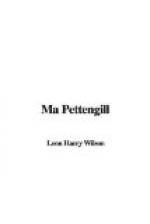The Prof laughed and said let the future take care of itself. He said we couldn’t tell what might happen, because, as yet, we was nothing really but supermonkeys. That’s what he called our noble race—supermonkeys! So I said yes; and these here philosophers that talked about subject and object and the nothingness of nothing reminded me of monkeys that get hold of a looking-glass and hold it up and look into it, and then sneak one paw round behind the glass to catch the other monkey. So he laughed again and said “Not bad, that!”
You could kid the Prof, which is more than I can say for Oswald. Oswald always took a joke as if you’d made it beside the casket holding all that was mortal of his dear mother. In the presence of lightsome talk poor Oswald was just a chill. He was an eater of spoon-meat, and finicking. He could talk like Half Hours With the World’s Best Authors, and yet had nothing to say but words.
Still, I enjoyed them evenings. I learned to be interested in vital questions and to keep up with the world’s best thought, in company with these gents that was a few laps ahead of it. But not so with the motherless chit. This here Lydia made no effort whatever to keep up with the world’s best thought. She didn’t seem to care if she never perfected her intellect. It would of been plain to any eye that she was spreading a golden mesh for the Oswald party; yet she never made the least clumsy effort to pander to his high ideals.
She was a wonder, that girl! All day she would set round the house, with her hair down, fixing over a lace waist or making fudge, and not appearing to care much about life. Come night, when the party was due to return, she would spry up, trick herself out in something squashy, with the fashionable streamlike effect and a pretty pair of hammock stockings with white slippers, and become an animated porch wren. That seemed to be the limit of her science.
Most motherless chits would of pretended a feverish interest in the day’s hunt for fossil cockroaches, and would even of gone out to chip off rocks with a hammer; but not Lydia. She would never pretend to the least infatuation for organic remains, and would, like as not, strike up something frivolous on her ukulele while Oswald was right in the middle of telling all about the secret of life. She was confident all the time, though, like she already had him stuffed and mounted. She reminded me of that girl in the play What Every Woman Thinks She Knows.
Lydia had great ideas of cooking, which is an art to ensnare males. She said she was a dandy cook and could make Saratoga chips that was all to the Kenosha—whatever that meant. Think of it—Saratoga chips! Over eight hundred ways to cook potatoes, and all good but one; and, of course, she’d have to hit on this only possible way to absolutely ruin potatoes. She could cook other things, too—fudge and stuffed eggs and cheese straws, the latter being less than no food at all. It gives you a line on her.




